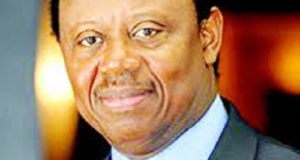By Simon Ugwu
In its determination to bring all strata of the income earners into the Financial market and ensuring that all money in circulation pass through the banking industry, the Nigeria Deposit Insurance Corporation (NDIC) recently organized the 2018 Workshop for Business Editors and Finance Correspondents Association of Nigeria (FICAN) with the theme, “Financial Inclusion, Consumer protection and the Evolution of Virtual Currencies in Nigeria” in Benin, Edo State.
The Corporation assembled a team of seasoned professionals to do justice to the theme.
Speaking at the opening ceremony, the Managing Diretor/Chief Executive, of the Corporation, Umaru Ibrahim stated that NDIC has the primary objectives of protecting bank depositors, promoting public confidence and ensuring financial system stability.
He said, “The Objective drive from the NDIC core mandates of Deposit Guarantee, Bank Supervision Distress Resolution and bank Liquidation. The Corporation has a crucial role to play in the successful delivery of the Federal Government Economic Recovery and Growth Plan(ERGP) as its activities help to stabilize the macroeconomic environment. Since inception in 1989, the NDIC has recorded tremendous stride in the implementation of its mandate and ensuring that over-riding public policy objectives for establishing an explicit Deposit Insurance System (DIS) in the country are fully realized.
“The Central bank of Nigeria (CBN) recently revoked the licenses of 154 Microfinance Banks (MFBs) and 6 primary Mortgage banks due to their insolvency. NDIC has commenced verification of insured depositors in fulfillment of our core mandate’, he said
“From the records obtained so far, majority of the depositors especially in the MFBs, have less than N2000, 000.00 in their accounts, which implied that NDIC will cover 100 percent of the depositors. The corporation will soon commence payment after verification.
Speaking on financial inclusion in Nigeria and the journey so far, the head, Financial inlucion secretariat, CBN, Temitope Akin-Fadeyi, said the presentation gives an insight into Nigeria’s financial inclusion Journey so far. He however listed the challenges to include Large size of the Nigerian population and the need to drill down implementation to State levels , low adoption of the agent banking model by banks and uneven distribution of access points across the country ,low literacy among clients on financial services particularly in rural areas , slow pace of implementation of the National Identification Scheme , Religious and cultural factors in the Northern parts of Nigeria hamper reach to women , Inappropriate financial services and continuous “sticking” to traditional and conventional models
Others are concentration of mobile money agents in the urban areas and slow penetration in the rural areas where they are most needed, slow understanding on the opportunities in serving excluded groups by various financial service providers and continuous exclusion of MSMEs despite interventions
He however stated that the National Financial Inclusion Strategy was launched in 2012 with the overall target of increasing adult financial inclusion to 80% in 2020.
As at 2016, he said, progress has been made since 2010: the percentage of adult Nigerians having access to formal financial services increased from 36.3 per cent in 2010 to 48.6 per cent in 2016. The percentage of adult Nigerians having access to bank accounts increased from 30.0 percent in 2010 to 38.3 per cent in 2016,so also total inclusion increased from 53.7 per cent in 2010 to 58.7percent in 2016.
He maintained that that there is prospects for reaching 80 per cent inclusion: as there is formidable governance structure: State level implementation arrangement , shared Agent Network Expansion Project with target of 500,000 agents by end 2019, target setting for states and financial service providers, revised capital base for microfinance banks Introduction of Payment Service Banks.
He reiterated commitment of stakeholders and opportunities for partnerships, adding that 80 percent adult exclusion rate is being kept in focus and the Bank will concertedly provide guidance and address the challenges on the way of reaching the goal by 2020.
Another interesting presentation was made by Mohammed Umar, director, Insurance Surveillance Department, NDIC on Cyber crime: implication for the Nigerian banking system.
Umar stated that computer crime, or cybercrime is any crime that involves a computer and a network. The computer may be used in committing a crime, or it may be the target.
“Cyber crime, in general, is defined as the unlawful acts in which a computer or other allied computing devices (such as mobile phones) are used as a target or a tool or both to conduct any criminal activity and includes every unlawful electronic method. Computer crime is when Computer is a target; Computer is a tool for the crime; and Computer is incidental to the crime”, he said.
Phishing, he said can be defined as online scam that frequently use unsolicited messages purporting to originate from legitimate organizations, particularly financial and insurance services, to deceive victims into disclosing their financial and/or personal identity information (PII) to commit or facilitate other crimes (e.g fraud, identity theft and theft of sensitive information).
Social Engineering, according to him is a non-technical method of breaking into a system or network. It’s the process of deceiving users of a system and convincing them to perform acts useful to the hacker, such as giving out information that can be used to defeat or bypass security mechanisms. Social engineering is important to understand because hackers use it to attack the human element of a system and circumvent technical security measures.
“Computer or internet browser suddenly running more slowly than normal, even after updating and restarting, may be a sign there is malware running on the computer. Malware, like a parasite, leeches processing power from the computer to do its job and the first clue is the slowdown effect”, he stressed.
He further stated that Pop-ups, intrusive advertisements and website redirects occurs, even with advertisement blockers, you are being inundated by annoying advertisements. “It’s likely you have either being compromised already or someone’s trying really hard to get you to click on one of the links and download some malware.
“The bank reported a Card-related fraud incident perpetrated by one of its customers – “the client” in August 2017. The client, a Petroleum Marketing and Distribution Company, which also runs a hospitality business (a rest house), applied for three (3) POS Terminals to facilitate payments by customers at its fuel stations, of which the bank availed the company only two (2) terminals”.
“Later in the year, the company requested that the POS terminals issued to them be re-configured for “online card-less entries” (Card-Not-Present – CNP), which the bank granted but only one of the terminals was re-configured. The “online card-less entries” (Card-Not-Present – CNP) service is normally provided to hospitality businesses, where customers could call to make reservations while providing their card details. The company claimed most.
Speaking further, he said, “The bank reported a internet/online fraud incident involving the sum of ₦1,231,105,298 which resulted in an actual loss of ₦492,033,271 to the bank. The nature of the fraud was an online-banking transaction using ‘password cracking’ perpetrated by a fraudster, who was subsequently arrested and handed-over to law-enforcement officers, hence the successful recovery of ₦739,072,027. Internet/Online-banking and ATM/Card-related fraud were the major cases reported by Deposit Money Banks (DMBs) in 2017, constituting 24,266 or 92.68% of all the reported cases, resulting in ₦1.51 billion or 63.52% of losses in the Industry during the year”.
In proffering solution for this crime, he said continuous capacity building for end users, there should be cooperation between actors/players and establishment of Institutional framework for coordinating cyber security issue/efforts. So also review of related Bills to further strengthen the cyber security. Continuous Public Awareness Campaign to educate the general public.
The enforcement of the cyber crime Laws and the office of the National Security Adviser (ONSA) according to him should play a more active and leading role in that campaign.
Speaking on Consumer protection in Nigeria, Challenges and the way forward, S.K. Salami-Alada, Director, Consumer protection Department, CBN, he listed the importance consumer protection in the financial system to include increased trust and confidence in the financial system, critical in an environment of constantly evolving complex disruptive technologies and vulnerabilities, improving access and usage of financial products and services-Financial inclusion, ensues increased access and usage translate into benefits to individuals and the economy.
Others include helps to protect consumers from market abuse and exploitation, helps consumers to make informed financial decision and appropriate how best to use and manage financial survives.
Speaking on digital banking, Chioma Ebele Mbanisi, hed, Digital banking, Mobile money, agent banking and disbursement projects, Stanbic –IBTC, said banks have their legacy systems and existing customers to consider in any migration / transformation into a digital operation. With a customer base that is made up of both tech savvy and non-savvy customers and since digitization is not a “one size fits all” banks will definitely face a challenge if they try to superimpose digital solutions on a traditional /non tech savvy customer.
Traditionally, she said, bank customers had long-term relationships with their banks. Sometimes this was built on loyalty, but mostly it was due to inertia and the difficulty of switching banks. The digital revolution has changed all that. Customers want ease of use, simplicity and responsiveness, highly personalized and customized services. Digital banking provides these and so, banks must have a digital relationship that must directly retain customer loyalty as digitally literate customers will instantly switch to another bank if they do not like what their current bank is offering
“Banks face the challenge of finding stable solutions to fluid problems and ever-changing demands. Whilst providing easy-to-use transactional services, they must also strive to create the warmth and engagement of a face-to-face exchange though a remote channel. This engagement must be so smooth that the customer never knows whether they are dealing with a person or not. Digitization is fraught with risks which Banks must manage by protecting themselves from cyber-attacks, combating financial fraud and all forms of money laundering. They must also devote resources on being compliant, and on build systems and processes to keep up with requirements and increasing regulations”, she added.
Speaking on implementation of the Micro, Small and Medium Enterprises in the development of Nigerian Economy by Tony Okpanachi, Managing Director, Development bank of Nigeria, he called on the government to assist prospective entrepreneurs to have access to finance and necessary information relating to business opportunities, modern technology, raw materials, market, which would enable them to reduce their operating cost, so also reduce the tax rate for SMEs to zero percent (0%) within their first three years of life, establish a National Rehabilitation Fund to provide resuscitating funds to viable but ailing SMEs, establish fiscal incentives and support such as tax rebate for SMEs which have demonstrated capabilities in local sourcing of raw materials, value addition to commodities for export as well as other business ethics and good corporate governance which government may wish to promote.
He further stated that the government should come up with a new pragmatic and realistic industrial policy that will address the current globalisation challenges as well as the emergent domestic challenges and problems in order to make the Nigerian SMEs globally competitive and set up an inter-ministerial body to coordinate all matters relating to SMEs. This body should comprise all relevant Ministries (Finance, Industry, National Planning, Commerce, Science & Technology, CBN, NASME, MAN, NACCIMA, NASSI, BOI and Committee of NAS) and SMEs.
Okpanachi maintained that the contribution of MSMES has been recognized as main sustenance of the economy because of their capacity in enhancing the economy output and enhance human welfare.
“However, it has been said that, most SMEs die within their first 5 years of existence, and another smaller percentage goes into extinction between the 6th and 10th year, thus only about 5-10% of young companies survive, thrive and grow to maturity. SMEs in Nigeria continues to face myriad of challenges. To achieve the full potential of SMEs in Nigeria, it is crucial for all the stakeholders in the SME sub-sector to be involved in policy formulations and implementation to attain expected results”, he said.

















Comments